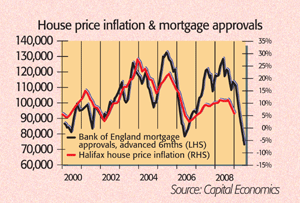
The credit crunch has gone global. The International Monetary Fund this week reduced its growth projections for the world economy for the second time in six months, noting that “the financial market strains originating in the US subprime sector have intensified”. Tougher lending standards threatened to undermine growth in the West as well as in the emerging world.
“Reports of decoupling have been greatly exaggerated,” said IMF chief economist Simon Johnson. Global growth is set to fall to 4.1% in 2008, the weakest since 2003; the eurozone will slow to 1.6% from 2.6% and the US will expand by just 0.8% in the year to the fourth quarter of 2008, down from 2.6% in 2007. Emerging market growth will fall from 7.8% last year to 6.9%. No wonder the IMF is gloomier.
In the US, the housing market continues to deteriorate, with the Case-Shiller index of prices in 20 large cities down by 7.7% in the year to November, compared to 6.1% in the previous month’s survey. Further price falls bode ill for consumption as housing wealth declines, a factor that will “more than offset” the boost to confidence from the tax-cut package being planned in Washington, as Hamish McRae pointed out in The Independent. Overborrowed consumers are finally set to increase their paltry savings, a trend reinforced by tighter credit standards, said Merrill Lynch’s David Rosenberg.
The slowdown hits Britain…
Here there will also be “plenty more weakness” in consumption as “the credit crunch and weak housing market trigger a rise in household savings from recent record lows”, said Michael Saunders of Citigroup. The housing downturn is “gathering speed”, said Capital Economics. Mortgage demand is now below the nadir of the 2004-2005 housing downturn, with December mortgage approvals at a 13-year low and “at levels which have historically led to year-on-year house price falls”. Credit conditions are “still tightening”. Despite December’s rate cut, Abbey and Nationwide have raised the price of their tracker mortgages. The securitisation market has virtually dried up, making it harder for lenders to raise funds to provide mortgages, said Melanie Bien of Savills.
…and the eurozone
Clouds are also gathering over the eurozone. An index of composite economic indicators for the eurozone has halved since February. French consumer confidence hit a 23-year low this week, suggesting consumption in the continent’s no. 2 economy will remain subdued early this year, said Lehman Brothers. Weaker consumer confidence suggests slower export and investment growth may not be offset by household spending this year, even though savings ratios are high, noted Capital Economics. Throw in softer emerging market growth and, as Johnson warned, “no one is exempt from a global slowdown”.